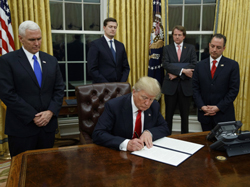Senator Robert Menendez (D-NJ) won a third time and Democratic candidate Mikie Sherrill flipped the Republican-leaning 11th Congressional District in the General Election on Tuesday, Nov. 6.
Despite his best efforts, Republican Senate candidate Robert Hugin, former executive chair of Celgene, a biopharmaceutical company, could not separate himself from President Donald Trump, a factor which Patrick Murray, Director of the University’s Polling Institute, noted in a report of the race this month.
The Senate race was closer than what would be expected in the predominately Democratic state of New Jersey. Hugin spent nearly $27.5 on TV ads against Menendez over the 2017 trial on charges against the incumbent Senator.
Poll results from Stockton, Quinnipiac, Rutgers-Eagleton, and the University’s polling institute all showed Menendez with a double-digit advantage leading up to the General Election. In his analysis, Murray explains that Menendez’s lead was largely due to the state’s disapproval of Trump, who has 55 percent disapproval rate, according to the report.
“If these poll results hold, the first person Bob Menendez should thank in his election night victory speech is Donald Trump,” Murray says in the published poll.
Trump eventually endorsed Hugin on Election Day, and after contributing $200,000 to help the president get elected and hundreds of thousands of dollars to Republican committees that supported the president’s agenda in 2016, Hugin had a difficult time distinguishing himself from the administration.
Menendez’s also had difficulties. Corruption charges in late January followed his campaign.
After an 11-week trial last fall, which resulted in a hung jury, District Court Judge William Walls declared a mistrial on all 12 charges against Menendez, but the indictment nevertheless stained his image and reputation.
“This is a tough year for Republicans to run in Democratic states or in swing districts, particularly because the president’s party does not do well in the first midterm election,” said Joseph Patten, Ph.D., an associate professor of political science.
On Tuesday night, Sherrill, a former Navy pilot and ex-federal prosecutor, won one of the most closely-watched U.S. House races in the nation, beating Republican Jay Webber and flipping a New Jersey district that Republicans have held for 34 years.
The race between Sherrill and Webber, a state assemblyman, came as Democrats across the nation were trying to regain control of the House from the Republicans in this midterm election.
According to the Cook Partisan Voting Index (PVI), the district has a score of R+3, meaning it tends to vote Republican. Sherrill won the election with more than 55 percent of the vote in the race. Trump won the district by one point in the 2016 election, but according to the University’s most recent poll, only 43 percent of NJ-11 voters approved of his performance in office.
“Even though Republicans have the edge in party affiliation, many are not happy with the president or key GOP initiatives such as the tax reform plan,” Murray said. The poll reported that the Republican tax reform plan passed in December is particularly unpopular in the district.
Despite its largely wealthier demographic, due to the adverse impact of the plan’s cap placed on the deduction for state and local income, property, and sales taxes in New Jersey, many voters in NJ-11 disapprove of the GOP.
Thirty-four percent of voters in the district “strongly disapprove” and 25 percent “strongly approve” of the tax reform.
Patten explained that another factor that might be reflected by the polls in this district is the predicted “pink wave” in this midterm election cycle. “A record number of women running for Congress,” said Patten. 57 percent of woman voters supported Sherrill.
The Institute also found that 24 percent of voters in the district polled that healthcare policy is the most important issue in making their choice for their representative.
41 percent of participants in NJ-11 report that they trust Sherrill more to work to keep health care costs affordable, compared to 29 percent who said that they trust Webber to do the same.
Sherrill, who had never run for office before, will succeed retiring Republican Rep. Rodney Frelinghuysen, who has held the seat since 1995.


